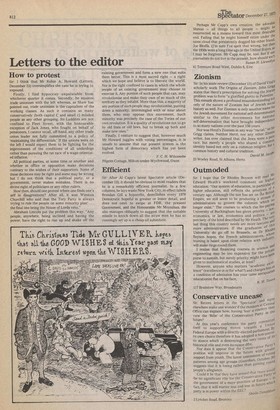How to protest
Sir: I think that Mr Robin A. Howard (Letters, December 13) oversimplifies the case he is trying to expound.
Firstly, I find hypocrisy unpalatable from whichever quarter it comes. Secondly, he equates trade • unionism with the left whereas, as Shaw has pointed out, trade unionism is the capitalism of the working classes. As such it contains as many conservatively (both capital C and small c) minded people as any other grouping. Its Luddites are not confined to Fleet Street; with the honourable exception of Jack Jones, who fought on behalf of pensioners, I cannot recall, off-hand, any other trade unionleader not fully committed to a policy of 'maintaining the differentials.' If the unions were on the left I would expect them to be fighting for the improvement of the conditions of all underdogs rather than pursuing the rat race of a wage-orientat ed inflation. ` All political parties, at some time or another and whether in office or opposition make decisions contrary to the wishes of their supporters. Some of these decisions may be right and some may be wrong but I do not think that a political party, or a government, never makes mistakes. There is no divine right of politicians or any other rulers.
How then, should one protest where one finds one's self in disagreement? After all, it was Winston Churchill who said that the Tory Party is always trying to rule the people on some minority plan' . . . the final one being the House of Lords veto."
Abraham Lincoln put the problem this way: "Any people, anywhere, being inclined and having the power, have the right to rise up and shake off the existing government and form a new one that suits them better. This is a most sacred right — a right which we hope and believe is to liberate the world. Nor is the right confined to cases in which the whole people of an existing government may choose to exercise it. Any portion of such people that can, may revolutionise and make their own of so much of the territory as they inhabit. More than this, a majority of any portion of such people may revolutionise, putting down a minority, intermingled with or near about them, who may oppose this movement. Such minority was precisely the case of the Tories of our own revolution. ft is a quality of revolutions not to go by old lines or old laws, but to break up both and make new ones."
Finally, I venture to suggest that, however much Mr Howard juggles with voting percentages, it is unsafe to assume that our present system is the highest form of democracy which has yet been evolved.
F. C. H. Witcombe Pilgrim Cottage, Milton-under-Wychwood, Oxon


































 Previous page
Previous page